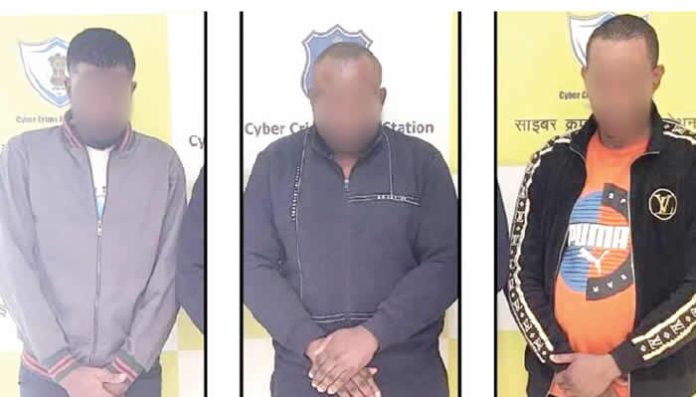Indian authorities have apprehended three Nigerian nationals in Delhi for their alleged involvement in defrauding an Indian woman of over Rs 2.62 lakh. The suspects, identified as Lezhu John, Gibril Mohammed, and Egboola Ekena, were arrested by cybercrime police in connection with a complex cybercrime racket that has reportedly victimized numerous individuals across India.
The trio faces charges under Section 66D of the Indian Information Technology Act, 2000, which criminalizes cheating by personation using digital means. Conviction under this law carries a minimum penalty of three years imprisonment and a fine that may extend to Rs 1 lakh. Additionally, they may also face charges under the Indian Penal Code.
Elaborate Fraud Scheme
The suspects allegedly operated a sophisticated cybercrime network using fake social media profiles to lure unsuspecting victims. According to police investigations, the accused possessed numerous photographs of men and women on their mobile phones, which they used to create fictitious online identities.
One such identity was “Sohn Yunmin,” a fabricated persona introduced to the victim as a chemical engineer from the United States. Building trust over time, the suspect convinced the woman to send him Rs 50,000 under the pretense of purchasing machinery. Subsequently, the woman received a call from an accomplice, “Niharika,” who claimed to be handling a parcel allegedly containing U.S. dollars sent by the suspect.
Through fabricated scenarios and repeated demands for money, the victim transferred additional funds amounting to Rs 1.69 lakh. Realizing she had been duped, she lodged a complaint with the Cybercrime Police Station, triggering the investigation.
Extensive Network Uncovered
Authorities revealed that the suspects had access to over 500 bank accounts used to execute their schemes, with more than 900 complaints filed across India linked to these accounts. “Investigations showed that the accused exploited numerous victims by creating fake social media profiles and orchestrating elaborate scams,” stated Vadodara Cybercrime ACP M.M. Rajput.
Tracking Down the Suspects
The suspects were traced using bank transaction details tied to the fraudulent activities. Despite their arrest, formal charges are yet to be filed in court. If convicted, they face significant legal consequences under Indian cybercrime laws.
Growing Concern Over Cyberfraud
This case underscores the rising menace of cyberfraud in India. Law enforcement agencies have called for increased vigilance among citizens to safeguard against such schemes. Meanwhile, authorities are continuing their investigation to unravel the full extent of the suspects’ network and to bring other potential accomplices to justice.
The incident serves as a reminder of the importance of cybersecurity awareness in an increasingly interconnected world.

